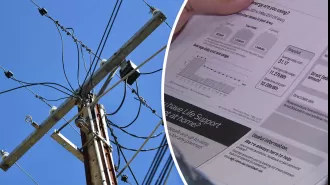Calculate the depreciation deductions for your short-term rental property easily with this helpful calculator.
"Many people have asked about the depreciation deductions they could get from a short-term rental that breaks even after expenses, according to Steve."
August 30th 2024.

Recently, I have been approached by several potential real estate investors who have expressed interest in understanding the depreciation deductions they can receive if they decide to set up a short-term rental. Their questions usually go something like this: "Hey Steve, let's say my rental income covers all my expenses, including the mortgage interest. Basically, I break even. But I also get depreciation deductions on the property. So, how much can I expect those deductions to be?"
To help answer this question, I have created a calculator below that provides an estimate based on real-life data and assumptions about how the cost segregation engineer allocates the costs. Simply enter your own numbers and click "Calculate."
Price:
Land Percentage :
Five-Year Property Percentage:
Fifteen-Year Property Percentage:
Residential Property Percentage:
Nonresidential Property Percentage:
Bonus Depreciation Percentage :
Calculate Depreciation
First Year Depreciation: $0.00
Second Year Depreciation: $0.00
Third Year Depreciation: $0.00
Fourth Year Depreciation: $0.00
Fifth Year Depreciation: $0.00
Sixth Year Depreciation: $0.00
Seventh Year Depreciation: $0.00
Before using the calculator, here are some tips to keep in mind:
- The default inputs are based on a cost segregation for a $1,000,000 residential property where the engineer has allocated 30% for five-year property, 10% for fifteen-year property, and 60% for residential property. These are just estimates, but they are also based on actual percentages from real-life studies.
- However, cost segregation engineers may also classify a short-term rental as nonresidential property, similar to a hotel. In that case, you may want to use different inputs, such as .15 for the five-year property, .3 for the fifteen-year property, and .55 for the nonresidential property. These are also real numbers that have been observed in studies.
- It's important to note that the actual percentage allocations will vary based on the specific property. So, use these examples to understand how the calculator works, but not as a guide for preparing your tax return.
- The bonus depreciation percentage for 2024 is .6, or 60%. However, it will decrease to .4, or 40%, in 2025 and .2, or 20%, in 2026.
Before using the calculator, there are a few caveats and qualifications to keep in mind:
- The calculator simplifies some of the calculations and assumes a mid-year convention for the five-year and fifteen-year property, which is often the case. However, if you purchase a property late in the year, this may be overly optimistic.
- For the first year, the calculator provides a half-year of depreciation on the real property. This may be slightly high or low in most cases, as depreciation for real property uses a mid-month convention and takes into account the month the property was placed in service. So, while the numbers should be close, they may not be perfect.
- Lastly, the calculator is designed for short-term rental properties in the United States. If your property is located outside of the country, the results may not be accurate.
For more resources on short-term rental tax strategies, check out "The Vacation Rental Tax Strategy" and "The Section 183 Short-term Rental Problem." And if you ever find yourself facing an IRS audit, "Surviving Short-term-rental IRS Audits" can help guide you through the process.
To help answer this question, I have created a calculator below that provides an estimate based on real-life data and assumptions about how the cost segregation engineer allocates the costs. Simply enter your own numbers and click "Calculate."
Price:
Land Percentage :
Five-Year Property Percentage:
Fifteen-Year Property Percentage:
Residential Property Percentage:
Nonresidential Property Percentage:
Bonus Depreciation Percentage :
Calculate Depreciation
First Year Depreciation: $0.00
Second Year Depreciation: $0.00
Third Year Depreciation: $0.00
Fourth Year Depreciation: $0.00
Fifth Year Depreciation: $0.00
Sixth Year Depreciation: $0.00
Seventh Year Depreciation: $0.00
Before using the calculator, here are some tips to keep in mind:
- The default inputs are based on a cost segregation for a $1,000,000 residential property where the engineer has allocated 30% for five-year property, 10% for fifteen-year property, and 60% for residential property. These are just estimates, but they are also based on actual percentages from real-life studies.
- However, cost segregation engineers may also classify a short-term rental as nonresidential property, similar to a hotel. In that case, you may want to use different inputs, such as .15 for the five-year property, .3 for the fifteen-year property, and .55 for the nonresidential property. These are also real numbers that have been observed in studies.
- It's important to note that the actual percentage allocations will vary based on the specific property. So, use these examples to understand how the calculator works, but not as a guide for preparing your tax return.
- The bonus depreciation percentage for 2024 is .6, or 60%. However, it will decrease to .4, or 40%, in 2025 and .2, or 20%, in 2026.
Before using the calculator, there are a few caveats and qualifications to keep in mind:
- The calculator simplifies some of the calculations and assumes a mid-year convention for the five-year and fifteen-year property, which is often the case. However, if you purchase a property late in the year, this may be overly optimistic.
- For the first year, the calculator provides a half-year of depreciation on the real property. This may be slightly high or low in most cases, as depreciation for real property uses a mid-month convention and takes into account the month the property was placed in service. So, while the numbers should be close, they may not be perfect.
- Lastly, the calculator is designed for short-term rental properties in the United States. If your property is located outside of the country, the results may not be accurate.
For more resources on short-term rental tax strategies, check out "The Vacation Rental Tax Strategy" and "The Section 183 Short-term Rental Problem." And if you ever find yourself facing an IRS audit, "Surviving Short-term-rental IRS Audits" can help guide you through the process.
[This article has been trending online recently and has been generated with AI. Your feed is customized.]
[Generative AI is experimental.]
0
0
Submit Comment





